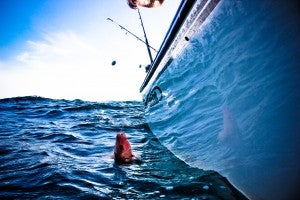The short seasons, decreasing bag limits and failing management of the recreational red snapper fishery in the Gulf of Mexico has everyone that cares about the fishery upset. States are demanding changes from the National Marine Fisheries Service (NMFS), lawsuits have been filed, contentious proposals are before the Gulf Council and Congress has started to look into the matter.
As always, a war of words is underway online and in the press – some of it is outrageous. Whenever the issue comes up that management is failing for recreational fishing, the Recreational Fishing Alliance tries to change the subject by promoting outlandish conspiracy theories and allegations. Most of these are aimed at EDF. We’re used to that by now.
They also attack mainstream anglers, because mainstream anglers such as the Coastal Conservation Association talk about the real issues – at least part of the time. CCA this week followed in the wake of the latest spasm from RFA, suggesting that EDF is backing a lawsuit filed by commercial fishermen. We are not.
We want recreational fishermen to be successful. We want the same thing for commercial fishermen and have made great progress working with that sector, including with the commercial fishermen who filed the lawsuit. While we cannot blame them for suing, it is not of our doing. We are working towards a management solution that is sustainable for the red snapper fishery and works for all parties involved. Here are the facts about EDF’s position on the recreational red snapper fishery and the recent lawsuit filed by commercial fishermen over NMFS’s mismanagement of it:
- EDF is neither a plaintiff in this lawsuit nor are we funding it.
- We agree with CCA and RFA that the short seasons and bag limits that are robbing the recreational side of the red snapper fishery stink and punish everyone, and we’re eager to discuss solutions. Regional management has been offered by CCA and other anglers as an alternative, and we agree that states are well-positioned to manage private anglers. Yet, the current proposals need significant changes in order to truly improve recreational management. Finding the ways that regional management could work is what we should be talking about.
- EDF is proud of its work with commercial fishermen, many of whom are parties to the lawsuit, to implement the red snapper IFQ for the commercial fishery, which has been a major factor in ending commercial overfishing and rebuilding the red snapper stock.
- EDF wants to sustain and improve the valuable economic engine of all fishing, commercial and recreational. The commercial red snapper fishery adds enormous economic value throughout the Gulf, employing workers in fish-processing, trucking, restaurants, retail outlets and numerous other businesses large and small. Recreational fishing, of which red snapper is a small part, also employs workers and brings revenue to the Gulf, as does all fishing and tourism combined.
- Whether you like to eat red snapper in a restaurant, buy it at the store or catch it yourself, you need the entire fishery to be economically successful and sustainable. The red snapper IFQ program has directly led to both those results on the commercial side. It’s past time to find a solution for the recreational side.
We think it’s time to talk about new solutions that can actually begin to solve some of the problems facing the fishery. EDF’s Gulf of Mexico Director, Pam Baker, recently laid out some of those solutions, including delegating authority to the states to implement programs like harvest tags and angler management organizations, in testimony to Congress on the red snapper situation. You can read Pam’s statement and her testimony here.
EDF is committed to continuing our work with all parties, especially anglers, to find a solution that meets recreational goals, complies with the law and rebuilding targets, and preserves the long-term benefits provided by this shared public resource.










